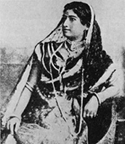Dasi, Binodini

Dasi, Binodini (c1860 -1941) actress and singer, was born in a suburb of Kolkata, inhabited by mainly sex-workers. Her family was poor and is said to have been involved in prostitution. In her biography, she called herself a prostitute. She was married at the age of five, but later had no connection with her husband; instead, she had to become successively the mistress of three persons, the last one sheltering her for twenty-nine years.
How humble her background might be, Binodini Dasi came to be known as the most famous actress of the nineteenth century Bengal. At the age of thirteen or fourteen, in December 1874, she made her debut in the Great National Theatre in a minor role, that of Draupadi. She worked for this theatre for two years and then briefly for the Bengal Theatre, but she settled down for a much longer period - six years - with the National Theatre, where the famous actor and playwright Girish Chandra Ghosh worked. It was from him that she really learnt the skill of acting and along with him that she founded the star theatre in early 1883.
She made a great personal sacrifice in order to establish this theatre, as she had to leave her patron whom she truly loved and had to become the mistress of another person who financed the new theatre. Ironically enough, she was able to work in this theatre for just over three years as she was forced to quit it in the face of hostility from her puritan colleagues.
However, Binodini reached the peak of her fame while she was at the Star Theatre. On 7 October 1885, Ramkrishna Paramahansha , the most revered Hindu religious guru of the nineteen century Bengal, came to watch her performance in the role of Chaitanya, in Chaitanyaleela and her performance impressed him so much so that he went down to the stage to meet Binodini and blessed her. bankim chandra chattopadhya also came to watch her perform and was highly in praise of her, as was swami vivekananda. Their visits were significant socially, because they thus gave approval to women's acting on the stage.
Binodini performed in ninety roles in more than fifty plays; and made women's participation on the stage acceptable to the society and advanced the cause of the Bangla theatre. However, hostile social circumstances forced her to retire from the stage when she was only about twenty-five. Many years later, she came back to performing art, but this time as only a singer when gramophone Company recorded her songs.
She had a knack for writing, and published her autobiography, Amar Katha (My Story) in 1912, in which she frankly unfolded her life, including how she was loved, loathed, betrayed and exploited by men. She wrote it in simple, yet attractive language, and it has established its due place in the history of Bengali autobiographical literature. [Ghulam Murshid]
